We may not have the course you’re looking for. If you enquire or give us a call on + 1-866 272 8822 and speak to our training experts, we may still be able to help with your training requirements.
Training Outcomes Within Your Budget!
We ensure quality, budget-alignment, and timely delivery by our expert instructors.
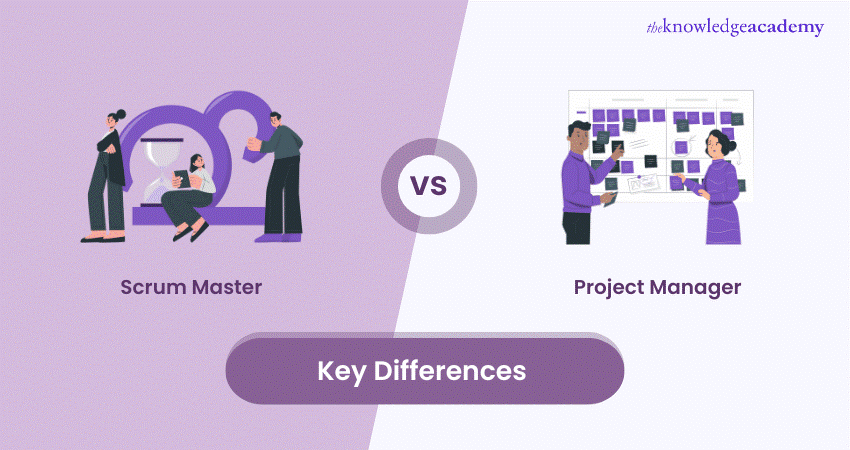
In the face-off of these two titans of Project Management, who emerges as the winning choice for most organisations? While these roles are often seen as interchangeable, having a firm grasp of their differences is key to harnessing their true potential.
While a Scrum Master champions Agile practices and team dynamics, the Project Manager juggles budgets, timelines, and overarching project goals. This blog breaks down the major distinctions in the Scrum Master vs Project Manager showdown, encompassing their features, salary prospects and more. Let's dive in!
Table of Contents
1) Who is a Scrum Master?
2) Who is a Project Manager?
3) Scrum Master vs. Project Manager: Key Differences
4) Scrum Master and Project Manager: Similarities
5) Scrum Master vs Project Managers: Salaries
6) Certifications for Scrum Masters and Project Managers
7) Conclusion
Who is a Scrum Master?
In the context of Agile approaches, a Scrum Master is an indispensable figure. This committed professional fosters a collaborative environment and helps the team to accomplish its objectives. With their expertise, a Scrum Master acts as the cornerstone that steers the Agile project in the right direction. Moreover, they uphold Agile principles throughout the process, drawing from their own experiences.
What Does a Scrum Master Do?
The role of Scrum Masters is multi-faceted since they oversee multiple tasks. Let’s dive into some of their responsibilities:
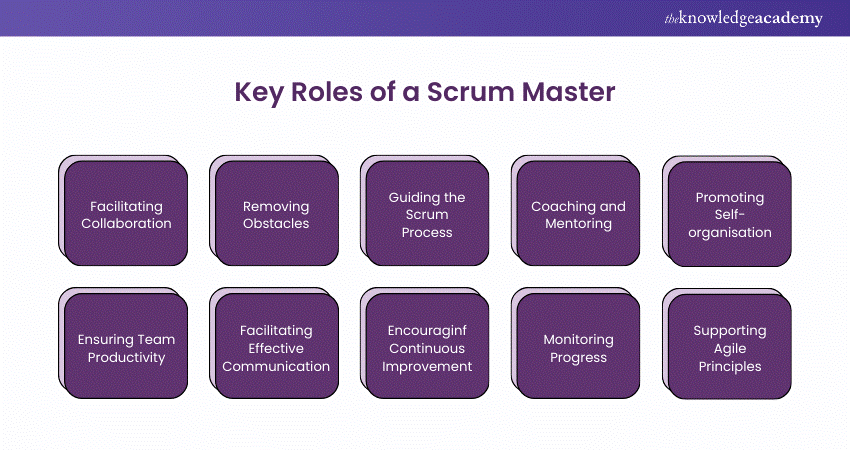
a) Establish effective communication channels by liaising with the team, product owner, and other business functions.
b) Shield the team from disruptions and ensure a smooth transition during changes.
c) Facilitate Scrum processes and ceremonies, ensuring their smooth execution and effectiveness.
Proactively identify and remove obstacles that hinder the team's progress in delivering outcomes.
Who is a Project Manager?
A Project Manager essentially coordinates project activities. With a wealth of experience, they meticulously plan, execute, and conclude projects. Their systematic approach often entails expertly applying traditional Project Management methods. Overall, they ensure that each aspect guarantees the successful completion of projects.
What does a Project Manager do?
Project Managers plan and execute the entire project lifecycle, from initiation to closure. The following points include some of their crucial responsibilities:
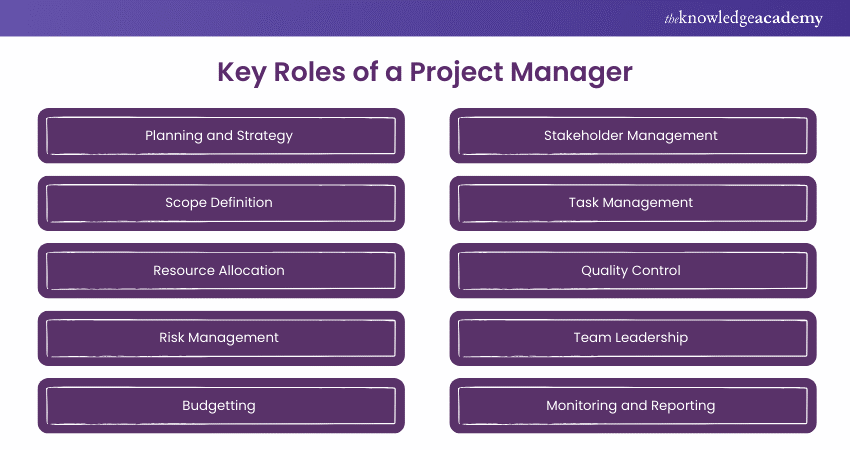
a) Develop schedules, allocate resources, and mitigate risks.
b) Assist Scrum Masters in leading teams without the additional responsibility of managing organisational tasks.
c) Maintain oversight of multiple teams and functions.
d) Guarantee satisfaction of all stakeholders' needs and expectations.
Hone your Project Management skills with our Project Management Courses today!
Scrum Master vs. Project Manager: Key Differences
Choosing between a Project Manager or a Scrum Master depends on the project's nature, complexity, and organisational context. Let’s learn the difference between Scrum Masters and Project Managers in detail:
Image description: Differences between Scrum Master vs. Project Manager
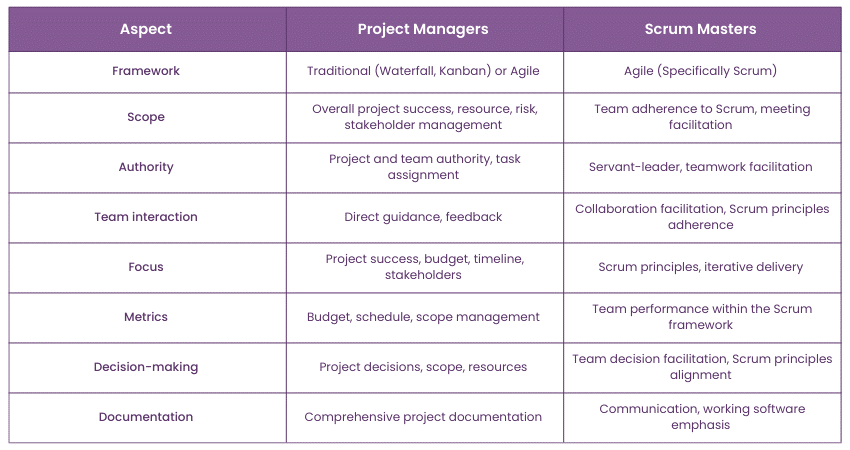
a) Framework: Project Managers operate within traditional Project Management frameworks such as Waterfall or Agile methodologies like Kanban. In contrast, Scrum Masters work specifically within an Agile methodology that emphasises iterative and incremental development.
b) Scope of Responsibility: Project Managers are responsible for overall project success, including managing resources, timelines, budgets, risks and stakeholder communication. Scrum Masters focus on ensuring team adherence to the Scrum Framework and facilitating meetings.
c) Authority: The Project Manager holds authority over both the project itself and its team members, assigning tasks, establishing deadlines and making project-related decisions. Conversely, the Scrum Master adopts a servant-leader role, facilitating teamwork and collective decision-making rather than exerting authority.
d) Team Interaction: Project Managers typically engage directly with team members to offer guidance, feedback, and direction. Conversely, Scrum Masters foster collaboration among team members and ensure adherence to Scrum principles and practices.
e) Focus: Project Managers ensure project success by achieving objectives, staying within budget and timeline, and meeting stakeholder requirements. In contrast, Scrum Masters prioritise adherence to Scrum practices and principles within the team.
f) Metrics: Project Managers focus on metrics such as budget variance, schedule adherence, and scope management. However, Scrum Masters concentrates on team performance metrics within the Scrum framework, like Scrum velocity and sprint burndown charts.
g) Role in Decision-making: Project Managers typically make decisions regarding project scope, budget allocation, resource management, and risk mitigation. Conversely, Scrum Masters facilitate decision-making within the team, ensuring alignment with Scrum principles.
h) Documentation: Project Managers are often responsible for comprehensive project documentation. While Scrum Masters prioritise facilitating communication and collaboration within the team over extensive documentation.
Learn in-depth about the key responsibilities of a Scrum Master; sign up for our Scrum Master Certification now!
Scrum Master and Project Manager: Similarities
Although several factors differentiate the Project Management and Scrum Mastering careers, they share certain similarities. The following points highlight some of their similarities:
a) The Scrum Master and Project Manager maintain continuous and efficient communication throughout all project phases to minimise errors. They value each other's feedback, manage risks and foster strong team cohesion.
b) These professionals operate at the same level; neither holds supreme authority. The Project Manager directly reports to stakeholders and clients. While Scrum Master reports to the product owner, clients and stakeholders.
c) Both individuals jeopardise success when they stray from core principles. This can happen if they lack essential skills for specific tasks or ignore team members’ opinions.
Scrum Master vs Project Managers: Salaries
Here’s a breakdown of the Scrum Master and Project Manager yearly salaries across three major regions – the UK, the US and India:
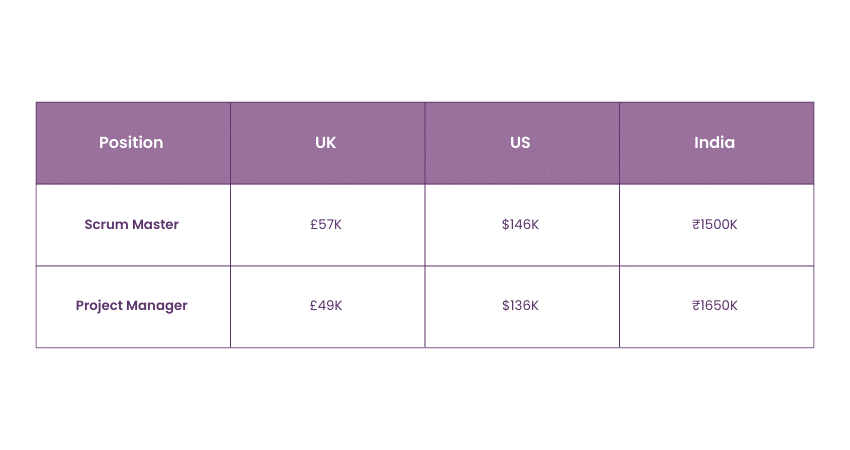
Source: Glassdoor
Certifications for Scrum Masters and Project Managers
Though their roles overlap, there are distinct certifications and professional paths that you can consider to elevate your career as a Project Manager or Scrum Master.
Scrum Master Certifications
Mentioned below are two common certifications that can make you an official Scrum Master. You can also check out a list of the most in-demand Scrum Certifications.
a) Certified Scrum Master (CSM): Administered by the Scrum Alliance, the CSM is among the most-mentioned Scrum Certifications in job descriptions and is widely recognised in the UK. You’ll need to sign up for a course and pass the subsequent exam to get the certification.
b) Certified Artificial Intelligence for Scrum Master: This certification will equip Scrum Masters with Artificial Intelligence (AI) knowledge and skillsets to enhance Agile practices.
Project Management Certifications
Project Management credentials can help start your Project Management career or further your current career:
a) Project Management Professional (PMP): Administered by the Project Management Institute, the PMP is widely recognised as a leading certification in Project Management. You’ll require at least three years of Project Management experience to qualify for the certification exam.
b) Certified Associate in Project Management (CAPM): The CAPM , administered by the PMI, is an entry-level Project Management Certification, requiring basic GCSEs and twenty-three hours of Project Management course to qualify for the certification exam.
How to Become Scrum Master or Project Manager?
Career paths for Project Managers and Scrum Masters offer distinct growth opportunities and trajectories. Understanding these paths can help professionals make informed decisions about their career development.
Project Manager Career Path
They have a well-defined career progression within the field of Project Management. They can advance from entry-level positions to senior Project Managers, Program Managers, or even executive leadership positions.
With experience, certifications, and a track record of successful project delivery, Project Managers can expand their responsibilities, manage larger and more complex projects, and lead diverse teams across various industries. Specialisations such as IT, construction, or healthcare Project Management can also open doors to industry-specific opportunities.
Scrum Master Career Path
Scrum Master Career Path looks promising so as in the Agile domain. They can start as Scrum team members and progress to become certified Scrum Masters. With experience and expertise, they can take on roles such as Agile coach, or Scrum consultant for larger and more complex projects.
Scrum Masters may also pursue certifications like Certified Scrum Professional (CSP) or Agile Coach to enhance their skills and credibility. Additionally, opportunities exist to specialise in specific industries or domains, such as software development, marketing, or finance and learning advanced methodologies and knowing key differences between Scrum vs SAFe will prove beneficial.
Professionals must consider their personal preferences, strengths, and career aspirations when choosing between Project Management and Scrum Master. Both paths offer exciting growth opportunities, and individuals should align their career choices with their interests and long-term goals.
Continuous learning, keeping yourself updated with industry trends, and actively seeking professional development opportunities are essential for success and advancement in either role.
Curious about the differences between PMP and Scrum? Check out our blog on PMP vs Scrum to deeper understanding!
Which is Better Scrum Master or Project Manager?
Understanding the project context and requirements is essential in determining whether a Project Manager or a Scrum Master is better suited for effective Project Management. The decision ultimately relies on several factors, including the intricacy of the project, stability of requirements, organisational culture, and the necessity for adaptability and teamwork.
Project Manager
They are well-suited for scenarios and project types that require a structured and comprehensive approach. They excel in complex, large-scale projects with well-defined requirements and a hierarchical organisational structure. Project Managers bring the following benefits to such projects:
a) Structured Approach: They are skilled at developing detailed project plans, defining clear goals and deliverables, and implementing a systematic approach to project execution. Their emphasis on planning and documentation ensures project requirements are met.
b) Resource Allocation: In projects that require careful allocation of resources, Project Managers excel at balancing the availability of personnel, equipment, and materials to ensure optimal project execution.
c) Risk Management: They are experienced in identifying potential risks, developing mitigation strategies, and monitoring risks throughout the project lifecycle. They prioritise risk management to minimise disruptions and maximise project success.
Project Managers are commonly employed in construction, engineering, information technology, and manufacturing industries, where complex projects with well-defined requirements and critical timelines are prevalent.
Join our Certified Global Project Manager (CGPM) Course to understand the principles of an effective Project Management system.
Scrum Master
Scrum Masters are particularly effective in situations and project types that demand adaptability, collaboration, and a flexible approach. Agile methodologies like Scrum excel in dynamic and rapidly changing projects. They provide the following advantages:
a) Dynamic Project Management: They thrive on projects with evolving requirements that need rapid adjustments and iterations. Scrum Masters facilitate an iterative approach that allows frequent feedback, continuous improvement, and flexibility in responding to changing circumstances.
b) Collaboration and Teamwork: This role promotes teamwork, collaboration, and self-organisation among project team members. They facilitate effective communication, empower team members, and create an environment that fosters creative takes and innovative minds.
c) Customer-centricity: Agile methodologies prioritise customer collaboration and satisfaction. Such professionals ensure that the project team remains aligned with customer expectations, enabling the delivery of high-value solutions.
They are commonly employed in software development, digital product development, marketing, and creative industries where projects require iterative development, rapid prototyping, and a high degree of customer involvement.
Conclusion
When choosing between a Scrum Master vs. Project Manager, understanding project requirements and organisational culture is critical. By assessing their needs and considering the strengths of each role, organisations can make informed decisions to ensure successful Project Management in today's dynamic business landscape.
Explore the relationship between Programme and Portfolio Management with our comprehensive Project Management Certification Course.
Frequently Asked Questions

The absence of a well-defined career trajectory and the ease of obtaining certifications can pose challenges to becoming a Scrum Master. Additionally, organisations actively seeking Scrum Masters operate within Agile contexts, further complicating the process of securing such a position.

The Scrum Masters job is high in demand and offers lucrative perks and excellent career growth opportunities. With numerous organisations embracing the Agile methodology nowadays, the employment for Scrum Master roles might witness an increasing rate.

The Knowledge Academy takes global learning to new heights, offering over 30,000 online courses across 490+ locations in 220 countries. This expansive reach ensures accessibility and convenience for learners worldwide.
Alongside our diverse Online Course Catalogue, encompassing 17 major categories, we go the extra mile by providing a plethora of free educational Online Resources like News updates, Blogs, videos, webinars, and interview questions. Tailoring learning experiences further, professionals can maximise value with customisable Course Bundles of TKA.

The Knowledge Academy’s Knowledge Pass, a prepaid voucher, adds another layer of flexibility, allowing course bookings over a 12-month period. Join us on a journey where education knows no bounds.

The Knowledge Academy offers various Scrum Certification Courses, including the Scrum Master Certification, Agile and Scrum Awareness, and Scrum for Teams. These courses cater to different skill levels, providing comprehensive insights into Scrum Development Team Roles and Responsibilities.
Our Project Management Blogs cover a range of topics related to Scrum and Project Management, offering valuable resources, best practices, and industry insights. Whether you are a beginner or looking to advance your Project Management skills, The Knowledge Academy's diverse courses and informative blogs have got you covered.
Upcoming Project Management Resources Batches & Dates
Date
 Scrum Master Certification
Scrum Master Certification
Thu 9th Jan 2025
Thu 13th Mar 2025
Thu 12th Jun 2025
Thu 7th Aug 2025
Thu 18th Sep 2025
Thu 27th Nov 2025
Thu 18th Dec 2025







 Top Rated Course
Top Rated Course



 If you wish to make any changes to your course, please
If you wish to make any changes to your course, please


